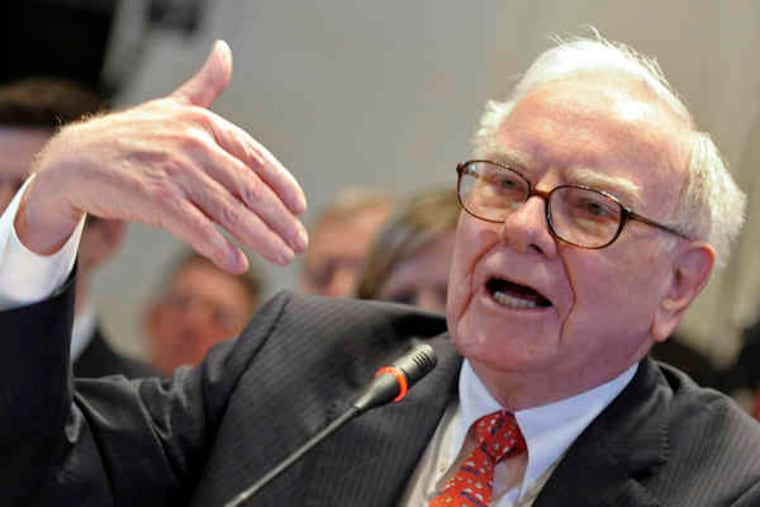CRASH RATINGS
NEW YORK - Billionaire investor Warren Buffett on Wednesday defended the basic business model of credit-rating agencies that gave top grades to mortgage-backed securities just before the housing bust in 2007 and 2008.

NEW YORK - Billionaire investor Warren Buffett on Wednesday defended the basic business model of credit-rating agencies that gave top grades to mortgage-backed securities just before the housing bust in 2007 and 2008.
"They made a mistake that virtually everyone in the country made," he told a panel appointed by Congress to assess the causes of the financial meltdown.
His company, Berkshire Hathaway Inc., owns 13 percent of Moody's Investor Service, one of the three major ratings agencies accused of helping to precipitate the financial crisis with inflated ratings on securities.
Buffett, seated next to Moody's chief executive Raymond W. McDaniel, said, "It's difficult to think of another model."
But Eric Kolchinsky, a former Moody's employee, testified that the agencies were compromised by a business model in which they were paid by the banks looking for good ratings on the securities they were trying to sell to investors.
Congress is looking to reform the credit-ratings agencies, eliminating that conflict of interest with legislation to put the agencies under stricter oversight.
The hearing was held by the Financial Crisis Inquiry Commission, which grilled Buffett for more than two hours. He was asked over and over if McDaniel should have lost his job, given the poor performance of Moody's, which, like rivals Standard & Poor's Corp. and Fitch Inc., slapped triple-A grades on hundreds of billions of dollars in mortgage-backed bonds that became all but worthless as housing crashed.
As homeowners defaulted, rating agencies downgraded the investments, helping to spark the overall crisis.
"Moody's is certainly not satisfied with the performance of these ratings" and is taking steps to improve its rating process, McDaniel said. He called Moody's performance "deeply disappointing."
Still, McDaniel said investors should use ratings as a tool, "not a buy, sell, or hold recommendation."
The commission subpoenaed Buffett to appear at the hearing after he declined to testify voluntarily.
Buffett did not criticize McDaniel, though he had nothing too positive to say on his behalf, other than that Moody's was no better or worse at predicting the financial fiasco than nearly everyone else on Wall Street.
"The entire American public was caught up in the belief that housing prices could not fall dramatically," he said. "They made the wrong call."
But he urged humility because "I was wrong on it, too."
He recalled that before the catastrophe started, he called the housing bubble a "bubble-ette," which he said Wednesday was "a terrible term to use - it was a four-star bubble."
Phil Angelides, chairman of the commission, was far more skeptical about the record of Moody's. In 2006, Angelides said, $869 billion worth of mortgage securities were rated triple-A - the top grade - by Moody's, and a large percentage of those securities were later downgraded.
"The miss was huge," he said of Moody's performance. "Ninety percent downgrade. Even the dumbest kid gets 10 percent on the exam."
Angelides noted that Moody's profited greatly from rating mortgage-backed securities. Revenue soared from $600 million in 2000 to $2.2 billion in 2007, just as the bubble in home prices was peaking.
The FCIC focused on Moody's Wednesday because commissioners said the company provided a useful perspective on the broader credit-rating industry, FCIC spokesman Tucker Warren said.